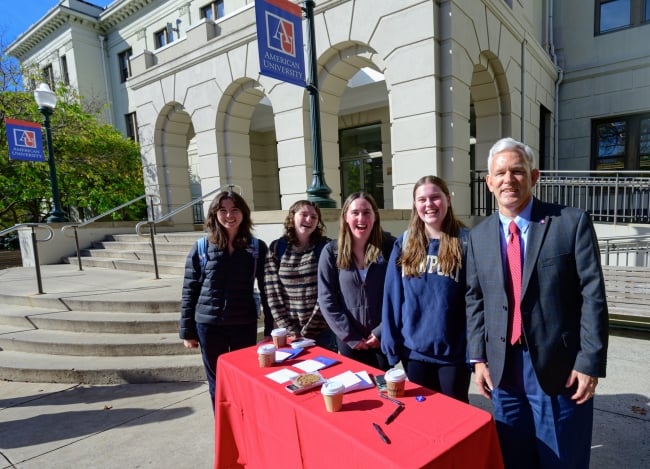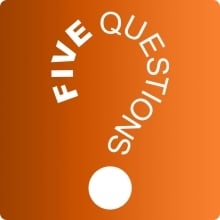You have /5 articles left.
Sign up for a free account or log in.

Alger (right) with students on World Kindness Day, at a table where community members were encouraged to write one another messages of appreciation.
Jeff Watts/American University
Jonathan Alger became American University’s 16th president on July 1, following 12 years at the helm of James Madison University in Virginia. A lawyer by training, he previously served as senior vice president and general counsel at Rutgers University and assistant general counsel at the University of Michigan. He has written and spoken extensively on higher education policy and legal issues surrounding diversity and free speech, among other things.

He stopped by Inside Higher Ed’s D.C. office on Wednesday—which he informed us was World Kindness Day—to introduce himself and answer a few questions. Then he headed back to the AU campus to hand out cookies and gift cards.
His responses have been edited for clarity and concision.
1. What’s the tenor been like on campus postelection?
I would say in general what I’m seeing is much more subdued than it was in 2016. I think people were not caught by surprise in quite the same way that they were eight years ago. And we have to remember: There are some people in the community who are happy, some who are upset; others are just deeply concerned and uncertain about what it means. So you’re dealing with that whole mix of emotions.
One of the ways that we have tried to address that is we have started what we call unity dinners—and this was a real risk. The first one was on the night of Oct. 7, when we invited the entire campus—faculty, staff, students—but you had to RSVP so that we wouldn’t have outside groups coming in. The idea was to bring the community together not to dwell specifically on the world events that day so much as to talk about our common humanity. At that first one, we had speakers from the Muslim, Christian and Jewish faiths all speak.
The second one was the day after the election, and my office co-sponsored it with the College Republicans and the College Democrats. You can imagine, as you’re planning this, thinking, “OK, what is it going to be like the day after the election?” But it actually turned out really well. We had people sitting at tables with people that they might not know, that they might not agree with politically, but the focus was, we’re still here. We’re all in this together.
It’s part of my civic life initiative, which is the signature piece of what I’m doing on campus. The idea is to look at the deep polarization, the epidemic of mis- and disinformation in our country, and say, “How do we not get them to all think the same way, that’s not the goal—but how do we help them with the rules of engagement?” And that starts with civil discourse, to develop skills of leadership and teamwork, communications, critical thinking, ethical reasoning, information and data literacy.
There are a number of components. We have already named a group of student civic life fellows—34 of them, freshmen all the way up to Ph.D. students. They are taking a class to prepare them for this role, where they’re going to help lead dialogues on campus on difficult topics and bring people together. We’re going to have faculty fellows. And then in the AU core, which is our general education program, there will be a course where students work on these skills of dialogue across differences. How do you engage in debates and discussion based on facts and evidence and research without vilifying people with whom you disagree? That’s what we’re trying to help our students do.
2. Your last job was at a public institution in Virginia, where Governor Youngkin has appointed members to the Board of Visitors and has said public university trustees serve the state rather than their institutions. Did that play a role in your decision to take the AU job, and more broadly, how do you think higher ed institutions should respond to efforts by state or federal politicians to exert more control over them?
Certainly, when you’re a public university, you know that you’re going to have to deal with state government, right? That’s how things are structured. In Virginia, the entire board is appointed by the governor. I always felt it was important in my role to try to get along with people regardless of which governor appointed them. I was there for 12 years, and I think there were four different governors, from both parties. The best conversations I had with board members were where you really couldn’t tell which governor had appointed them.
For me, the opportunity to come to AU was, of course, it’s a private university, so you didn’t have those dynamics. But what really drew me was the mission as well as the location. AU is a school I’d always sort of had my eye on.
At the end of the day, the educational mission is what we have to protect. There can be government overreach of all kinds of coming from either side of the aisle. We have to speak out when it does happen. Attacks might come from either side telling how to teach or what to teach. That’s when we have to stand up and say, “No, those are educational judgments that need to be made by the educators.” That’s what our role has to be.
3. Under your leadership, JMU became part of Campus Call for Free Expression, a group committed to preserving free speech on campus. How do you decide where to draw the line? Does free expression cover chants of “From the river to the sea, Palestine will be free”? Encampments? How do you balance freedom of expression with the need to preserve safety and security on campus?
Those are very nuanced questions that you have to look at on a context-specific basis. But the balance we’re responsible for, as I see it, is, on the one hand, we have a legal obligation to prevent discrimination and harassment on campus, right? And there are legal definitions of that. That is balanced with the rights of free expression, knowing that there’s expression that’s going to be offensive to people on campus, that they’re going to disagree with. I recognize that that’s a hard balance, and it’s hard for a lot of people to understand.
Some of it is an educational problem—helping people to understand that these are two different responsibilities that we have to take into account as a university. And while they may look like they’re in tension with one another, both contribute to basically what it means to be in a democratic society. That’s kind of the starting point. I don’t make absolute, bright lines to say this statement or that statement is permissible; that’s actually not typically how the law works in this area. You’ve got to look at the context—are individuals being threatened versus more general statements?
You also have to get people to understand that you may have the right to say something, but is it the right thing to do at that particular moment? It’s rights and responsibilities—if you’re going to live in community, to recognize what that balance means in terms of your own conduct—and that’s something else we’ve been talking to students about.
4. AU is in the midst of a debate about whether to arm campus police. According to the student newspaper, a majority of students oppose that plan. Would you approve it over their objections, and why is it necessary?
I haven’t made up my mind yet. This is a great example of actually going through a process, right? And, you know, one of the things I feel very strongly about is that we’ve got to educate the community about what all the issues are here. It’s actually very complicated: There are lots of campuses that have armed police officers; there are some that don’t. I was at JMU when we had to send officers over to Bridgewater College when two of their security officers were killed by an armed gunman who came to campus. Virginia Tech was just down the road, and they had over 30 people killed in an attack. So part of it is making sure that our students and faculty and staff understand: What are the issues involved? What’s the relationship with the [D.C.] Metropolitan Police? How does that work?
The emphasis is on campus safety—that’s the goal. And then the question is, what’s the best way to achieve that goal? What we’re trying to model is an educational process. I think we’ll have a better result as we talk about the nuances, as we hear from the experts in law enforcement on “here’s what works, here’s what doesn’t work,” when we hear the concerns from the community. By going through that process, whatever decision we reach is going to be a better decision. I just don’t know what that’s going to be yet, because we’re not at the end.
5. What do you think a second Trump term will mean for higher education in general and specifically for higher ed in D.C., given his threat to end Home Rule?
I was not here previously with the Home Rule discussion, so I’ll be curious how that plays out.
I think a lot of areas are going to change, right? One of the first that comes to mind is Title IX policy. And I think we all feel—those of us [who] have been around for a while—like it’s been this whipsaw, back and forth. With one administration, and there’s certain set of regulations you have to live by, and then the next one comes in, and they go the complete opposite direction. So yet again, I think we’re going to experience that when it comes to Title IX cases, and that’s really hard on staff as well as students, because you’ve got to train people to know how to do this, consistent with what can be fairly complicated rules and regulations.
I worked at the Office for Civil Rights in the U.S. Department of Education, and I lived through a political transition. We went from Bush I to the Clinton administration, so I’ve seen how there could be changes in emphasis in civil rights enforcement, and I expect we’ll see more of that depending on who the appointees are. And things like student loans—I don’t quite know where that’s going to go, but my main concern is that, whatever the rules are, I want students to have access to higher education. I think there’s a lot of uncertainty right now and many of us are feeling a lot will depend on who the appointees ultimately are, and certainly the secretary of education will play an important role.




